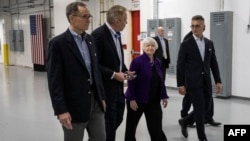U.S. Treasury Secretary Janet Yellen will travel to China this week for high-level talks aimed at further stabilizing financial and economic relations between the world’s two largest economies.
During her visit, she is also expected to press China on clean energy subsidies and industrial overcapacity, which she recently noted “hurts U.S. businesses and workers and hurts businesses and workers around the world.”
April 3-9 was Yellen’s second visit to China, a day after U.S. President Joe Biden and Chinese President Xi Jinping had their first phone call since their meeting in November last year. It comes as scrutiny of Beijing intensifies ahead of the U.S. presidential election and Washington tightens restrictions on Chinese sales of high-tech products.
After the 105-minute phone call, Xi Jinping warned Biden that the United States was “creating risks” by suppressing China’s trade and technological development, state-run Xinhua News Agency reported.
In addition to meeting China’s economic czar, Vice Premier He Lifeng, and other current and former central government officials, Yellen will meet with students, professors and business leaders, said a senior Treasury official who briefed reporters before the trip.
Her visit begins with a two-day stop in the southern city of Guangzhou, where Yellen will hold a roundtable discussion with economic experts to discuss challenges and opportunities for China’s economy and meet with U.S. business leaders and Wang Yi, the governor of Guangdong Province. Great.
“Secretary Yellen is interested in listening to the various voices in China to better understand the current dynamics in the country,” the official said.
In Beijing, Yellen will meet with students and professors at Peking University and some of China’s leading economists. Her meetings with central government officials will include talks with China’s central bank governor and finance minister.
During her visit, Yellen will also meet with China’s No. 2 official, Li Qiang.
A senior Treasury official said the trip was intended to build on Yellen’s intensive diplomacy to manage relations between the two countries. Since her first visit to China last July, Yellen and Beijing’s Lifeng established an economic and financial working group. The panels discussed issues facing both countries — such as China’s housing crisis or the collapse of two major U.S. banks last year — and policy responses.
In recent weeks, the United States and the European Union have increased their focus on subsidies and the impact of overcapacity and cheap exports of Chinese goods.
Gary Clyde Hufbauer, a senior fellow at the Peterson Institute for International Economics and a former Treasury official, said he believed the main purpose of Yellen’s trip was to discuss overcapacity with Chinese officials. But he doesn’t expect China to take any action.
“China may give a compassionate answer, but I don’t expect a change in policy,” he told VOA’s Mandarin service via email.
Yellen said last week she did not want to focus on retaliation but would warn China about the impact of its state underwriting of energy and other companies during the visit.
“When I visit China, I plan to talk to the Chinese about overcapacity in some of these industries and make sure they understand the adverse impact this has on the United States and many other countries, including our closest allies, with cheap goods flooding the market. ” Yellen said.
She made the remarks during a visit to a solar manufacturing plant in Georgia, one of several key battleground states in the upcoming presidential election.
Former U.S. President Donald Trump once said that if elected, he would impose tariffs of up to 60% on China.
In late February, the U.S. Commerce Department launched an investigation into whether Chinese vehicles pose a threat to national security because of the data they transmit. U.S. lawmakers have also called on Biden to increase tariffs on Chinese electric vehicles. The European Union is also investigating China’s subsidies for the electric vehicle industry.
On Wednesday, the European Commission announced an investigation into possible subsidies received by two Chinese-owned solar panel companies. The two companies are competitors in a public tender for a solar power park in Romania.
Li Ya and VOA Mandarin contributed to this report. Some information comes from Reuters and AFP.
Follow us on Google news ,Twitter , and Join Whatsapp Group of thelocalreport.in
